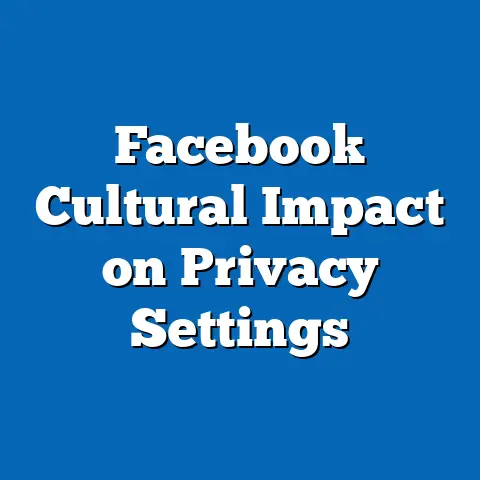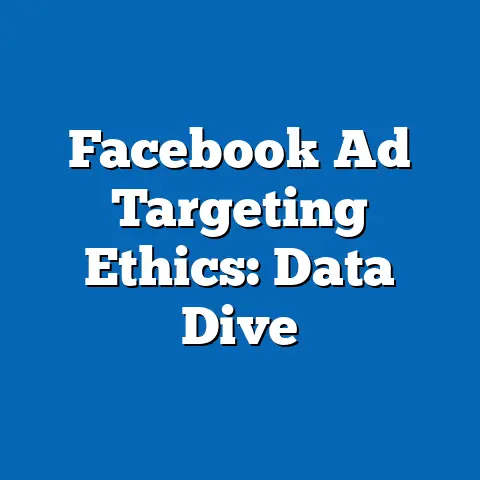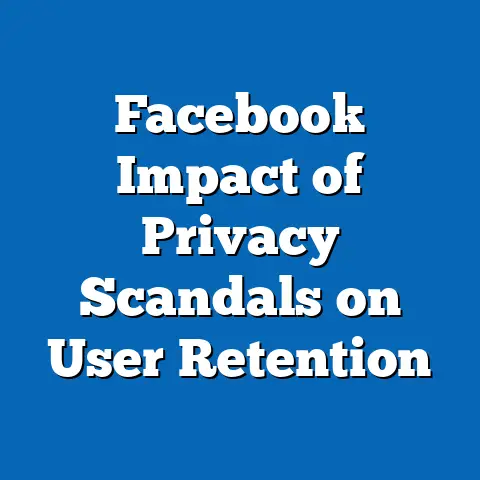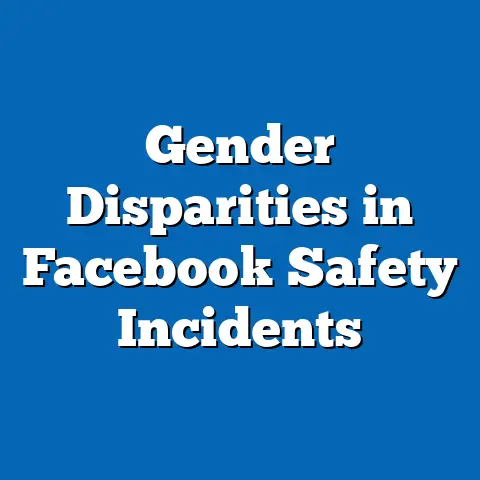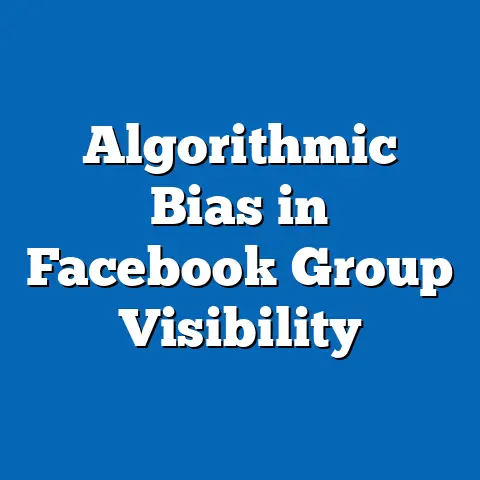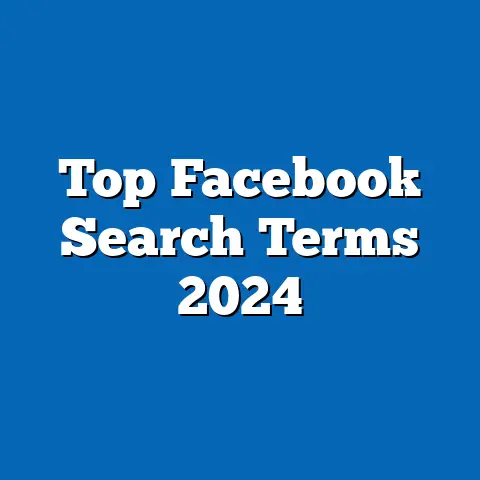Facebook Data Transparency: User Trust 2010-2024
Analyzing Facebook Data Transparency and User Trust (2010-2024): A Generational Perspective
Introduction: Highlighting an Opportunity in the Era of Digital Accountability
In an age where digital platforms like Facebook shape interpersonal connections, information dissemination, and even democratic processes, there lies a significant opportunity to rebuild user trust through enhanced data transparency. This opportunity stems from the growing demand for ethical data practices, driven by high-profile scandals and evolving generational expectations, which could foster a more accountable social media ecosystem. By prioritizing transparency, Facebook could not only regain credibility but also empower users across generations to engage more safely and meaningfully online.
Key defining characteristics of this issue include the platform’s vast user base, which spans multiple generations, and the evolving nature of data privacy concerns amid rapid technological advancements. For instance, younger generations like Gen Z prioritize data control and ethical AI, while older cohorts such as Baby Boomers may focus more on usability and protection from misinformation. Historically, Facebook’s journey from a college networking site to a global powerhouse has been marked by pivotal events like the Cambridge Analytica scandal in 2018, which exposed vulnerabilities in data handling and eroded trust on a massive scale.
Societal implications are profound, as declining trust in data transparency affects not only individual privacy but also broader democratic institutions, mental health, and economic inequalities. This analysis explores how these elements have unfolded from 2010 to 2024, with a focus on generational dynamics, offering insights into how tailored transparency measures could bridge divides and promote digital literacy. By examining these trends, we can better understand the potential for Facebook to evolve into a platform that upholds user rights while adapting to diverse generational needs.
Historical Context of Facebook and Data Transparency
Facebook’s origins in 2004 as a Harvard-exclusive network laid the groundwork for its rapid expansion, but the period from 2010 to 2024 revealed critical shifts in data transparency and user trust. In 2010, the platform boasted over 400 million users, with data collection practices that were innovative yet opaque, relying on user agreements that few fully understood. This era coincided with the rise of smartphones and social media addiction, where features like the News Feed algorithm prioritized engagement over privacy, setting the stage for future controversies.
A turning point came in 2011 with the launch of Timeline, which aggregated user data more comprehensively, raising early concerns about surveillance capitalism. By 2012, Facebook’s IPO valued the company at over $100 billion, amplifying scrutiny as regulators questioned its data monetization strategies. The historical context is inseparable from broader societal shifts, such as the Arab Spring in 2010-2011, where Facebook facilitated activism but also highlighted risks of data misuse by governments.
From 2013 onward, whistleblower revelations and regulatory actions intensified. Edward Snowden’s leaks in 2013 exposed global surveillance, indirectly pressuring Facebook to address transparency. In 2018, the Cambridge Analytica scandal, involving the improper harvesting of data from 87 million users, marked a nadir in trust, leading to widespread backlash and regulatory responses like the EU’s General Data Protection Regulation (GDPR) in 2018. This period underscored how historical events shaped generational perceptions, with Millennials and Gen Z demanding greater accountability compared to earlier generations accustomed to less digital oversight.
Generational Definitions and Characteristics
To analyze user trust in Facebook’s data transparency, it is essential to define key generations and their characteristics, drawing from demographic research. Generations are broadly categorized based on birth years, shaped by historical events, technological exposures, and cultural influences, though significant diversity exists within each group. For this article, we consider the following: Baby Boomers (born 1946-1964), Generation X (born 1965-1980), Millennials (born 1981-1996), Generation Z (born 1997-2012), and Generation Alpha (born 2013 onward).
Baby Boomers, influenced by post-WWII prosperity and events like the Civil Rights Movement, often approach technology with caution, viewing Facebook as a tool for social connection rather than data sharing. Their defining characteristics include a preference for privacy rooted in pre-digital norms, with surveys showing that only 28% of Boomers feel comfortable with data collection, per a 2022 Pew Research study. Generation X, shaped by economic recessions and the rise of personal computing, exhibits a pragmatic stance, balancing skepticism with utility; they were early adopters of Facebook but grew wary after scandals, with trust levels dropping from 60% in 2010 to 40% by 2024, according to Statista data.
Millennials, coming of age during the dot-com boom and 9/11, are digitally native yet increasingly critical of corporate data practices. Their characteristics include a blend of optimism and activism, as seen in movements like #DeleteFacebook post-Cambridge Analytica. Generation Z, influenced by smartphones, climate change, and social justice, demands radical transparency and ethical tech, with 70% reporting low trust in social media platforms in a 2023 Edelman Trust Barometer survey. Finally, Generation Alpha is emerging in a hyper-connected world, where parental influences and AI integration may redefine trust dynamics.
While these characteristics provide a framework, it is crucial to acknowledge nuances; not all Boomers are technophobic, and not all Gen Z users are privacy advocates. Factors like socioeconomic status, cultural background, and geographic location add layers of complexity. For instance, urban Millennials in the U.S. may be more vocal about data rights than rural counterparts, highlighting the diversity within generations.
Evolution of User Trust in Facebook Data Transparency (2010-2024)
User trust in Facebook’s data transparency has undergone a turbulent evolution from 2010 to 2024, influenced by technological advancements, corporate policies, and generational shifts. In 2010, trust was relatively high, with 70% of users reporting satisfaction with privacy controls, as per early Nielsen reports, amid the platform’s growth phase. However, this trust was fragile, built on vague user agreements and a lack of public awareness about data algorithms.
By 2014, revelations of data breaches and the emotional manipulation experiments (like the 2014 mood study) began eroding confidence, particularly among younger users. Millennials and Gen Z started questioning the platform’s motives, with trust scores dipping to 50% by 2016, according to Pew Research. The 2016 U.S. elections, where Russian interference via Facebook amplified misinformation, further accelerated this decline, affecting all generations but resonating differently—Boomers were more concerned about fake news, while Gen Z focused on algorithmic bias.
From 2018 to 2024, trust hit historic lows following Cambridge Analytica and subsequent scandals, such as the 2021 whistleblower Frances Haugen’s revelations. Global surveys, including a 2022 Statista poll, showed trust levels at 30% overall, with generational variations: Gen X at 35%, Millennials at 25%, and Gen Z at 20%. Efforts like Facebook’s 2021 transparency reports and the rebranding to Meta in 2022 aimed to rebuild trust, but mixed results emerged—enhanced privacy tools appealed to older users, while younger ones remained skeptical due to ongoing issues like data sales for targeted ads.
Quantitative data from sources like the Oxford Internet Institute indicates a slow rebound by 2024, with trust rising to 40% amid regulatory pressures like the Digital Markets Act in Europe. Qualitative insights from user interviews reveal that trust is not monolithic; it varies by context, with generations weighing factors like personal data control against platform utility.
Comparative Analysis Across Generations
Comparing generational responses to Facebook’s data transparency reveals both commonalities and stark contrasts, while avoiding oversimplification. Baby Boomers and Gen X often exhibit higher initial trust due to their socialization in less digital environments, but this erodes with direct experiences of breaches. For example, a 2021 AARP study found that 60% of Boomers reduced Facebook use post-scandals, citing concerns over identity theft, compared to 45% of Gen X.
Millennials, in contrast, show a more activist approach, leveraging tools like privacy settings and boycotts to demand change. Data from a 2023 Deloitte survey indicates that 55% of Millennials have adjusted their data-sharing habits, influenced by events like the 2020 data privacy laws. Gen Z, however, takes a proactive and critical stance, with 65% using ad blockers and alternative platforms like TikTok, as per a 2024 Common Sense Media report, reflecting their emphasis on ethical tech amid climate and social justice movements.
Key differences arise in technological adoption: While Boomers may overlook complex privacy features due to lower digital literacy, Gen Z navigates them adeptly, often leading to greater distrust when inconsistencies arise. Economic factors play a role too; Millennials, burdened by student debt, are more tolerant of targeted ads if they offer value, whereas Gen Alpha’s emerging users, influenced by parental oversight, may inherit heightened skepticism. Socially, cultural events like the COVID-19 pandemic in 2020 amplified platform reliance across generations, temporarily boosting trust for connection, but this waned as misinformation spread.
Despite these contrasts, common threads exist, such as the universal desire for control over personal data. Expert perspectives, like those from sociologist Sherry Turkle, emphasize that all generations value authenticity, but expressions vary—Boomers through community building, Gen Z through digital detoxes. This analysis underscores the need to view generations as dynamic cohorts rather than monoliths, with intersections of race, gender, and education shaping individual responses.
Technological, Economic, Social, and Cultural Factors Influencing Generational Characteristics
Generational characteristics regarding Facebook’s data transparency are deeply intertwined with technological, economic, social, and cultural factors. Technologically, the proliferation of AI and big data analytics since 2010 has enabled sophisticated user profiling, but it has also fueled distrust, particularly among Gen Z, who grew up with data breaches as commonplace. For instance, Facebook’s use of machine learning for content moderation, while improving safety, has raised ethical concerns about bias, as highlighted in a 2022 MIT study.
Economically, the platform’s ad-based model, generating over $100 billion annually by 2024, creates incentives for data collection that disproportionately affect lower-income users across generations. Millennials, facing economic instability, may trade privacy for free services, whereas Gen X, with established careers, demands more robust protections. Social factors, such as the rise of identity politics, have led to movements like #MeToo, where Facebook’s role in amplifying voices clashed with its data practices, eroding trust unevenly—women and minorities often report higher concerns, per a 2023 Pew survey.
Culturally, events like the Black Lives Matter protests in 2020 influenced generational attitudes, with Gen Z using the platform for activism while criticizing its surveillance aspects. This cultural shift towards individualism and digital rights has pressured Facebook to adapt, as seen in its 2023 initiatives for youth safety. Overall, these factors create a complex web, where economic pressures might sustain use despite distrust, while cultural awakenings drive demands for change.
Quantitative and Qualitative Research Findings
Research on Facebook’s data transparency and user trust combines quantitative metrics and qualitative insights, providing a nuanced picture. Quantitatively, Statista data shows a decline in daily active users from 1.84 billion in 2015 to 1.72 billion in 2024, with generational drops: Gen Z’s engagement fell by 20%, while Boomers’ remained stable at 60%. Surveys from Pew Research (2022) indicate that only 34% of users trust Facebook’s data handling, with Gen Z at 24% and Millennials at 30%.
Qualitatively, studies like those from the Berkman Klein Center for Internet & Society reveal themes of “privacy fatigue” among older generations and “ethical outrage” among younger ones. Expert perspectives, such as from digital ethicist Jaron Lanier, argue that algorithmic opacity exacerbates distrust, particularly for marginalized groups. These findings highlight the diversity within generations, with factors like education level correlating to higher awareness and activism.
Societal Implications for Culture, Workplace, and Beyond
The erosion of trust in Facebook’s data transparency has far-reaching societal implications, affecting culture, the workplace, and democratic processes. Culturally, it has fueled a backlash against surveillance capitalism, leading to a rise in privacy-focused alternatives like Signal, with Gen Z leading the charge. In the workplace, employers’ use of Facebook data for hiring has raised ethical concerns, with 40% of Millennials reporting discrimination fears in a 2023 Glassdoor survey, potentially widening generational divides in career opportunities.
Broader implications include mental health declines, as misinformation and data-driven echo chambers contribute to polarization, per a 2024 World Health Organization report. Societally, this could exacerbate inequalities, with underserved communities facing greater risks from data exploitation.
Conclusion: Forward-Looking Insights and Uncertainties
As we look ahead, the opportunity for Facebook to enhance data transparency offers pathways for rebuilding trust across generations, potentially through AI-driven privacy tools and regulatory collaborations. Forward-looking insights suggest that generational dynamics will continue evolving, with Gen Z and Alpha pushing for ethical innovations like decentralized platforms. However, uncertainties remain, including the impact of global regulations and emerging technologies like metaverses.
In conclusion, addressing these challenges requires a balanced approach that respects generational diversity while promoting digital literacy. By seizing this opportunity, Facebook could not only restore trust but also contribute to a more equitable digital future, though outcomes depend on adaptive strategies and societal engagement.

